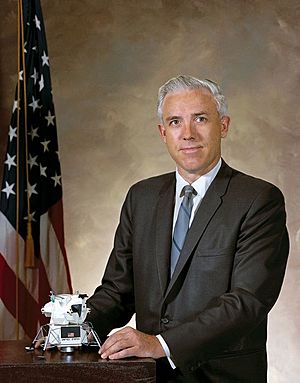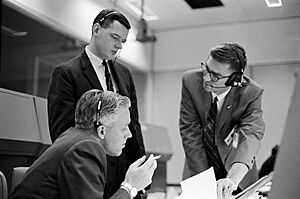John Hodge (engineer) facts for kids
Quick facts for kids
John Hodge
|
|
|---|---|

Hodge in 1969
|
|
| Born |
John Dennis Hodge
10 February 1929 Leigh-on-Sea, Essex, England
|
| Died | 19 May 2021 (aged 92) |
| Nationality | British |
| Alma mater | Northampton Engineering College University of London |
| Scientific career | |
| Institutions | NASA |
John Dennis Hodge (born February 10, 1929 – died May 19, 2021) was a brilliant British engineer. He played a big role in the early days of space travel. Hodge worked for NASA, America's space agency. He was a special kind of leader called a flight director.
As a flight director, he helped guide astronauts during their missions. He is famous for helping to save the crew of Gemini 8. This mission had astronauts Neil Armstrong and David Scott aboard. Later, he also helped plan the International Space Station.
Contents
Early Life and First Jobs
John Hodge was born in Leigh-on-Sea, England, in 1929. He went to school in London. Then, he studied engineering at the University of London. He graduated in 1949 with top honors.
After college, Hodge worked as an engineer. He joined a company called Vickers-Armstrongs. In 1952, he moved to Canada. There, he worked on a fast jet plane project. It was called the Avro Arrow.
Working at NASA
In 1959, the Avro Arrow project ended. John Hodge and many other engineers moved to the United States. They joined NASA. NASA was just starting its human spaceflight program. This group was called the Space Task Group.
Hodge became an assistant to Chris Kraft. Kraft was NASA's first flight director. A flight director leads the team that guides spacecraft. They make sure missions go smoothly.
First American in Orbit
In 1962, John Hodge was a flight director for a historic mission. This was John Glenn's flight aboard Friendship 7. Glenn was the first American to orbit Earth. Hodge was working at a tracking station in Bermuda.
Becoming a Flight Director
In 1963, Hodge became a full flight director. He was only the second person to hold this important job. He chose blue as the color for his flight control team.
He worked on many missions, including Gemini 8. He was the main flight director for this mission. This was a very challenging flight.
The Gemini 8 Mission
During the Gemini 8 mission, something went wrong. The spacecraft started spinning out of control. Astronauts Neil Armstrong and David Scott were in danger. John Hodge was the flight director on duty.
Hodge and his team had to act fast. They told the astronauts what to do. They gave them instructions to fire rockets. This helped stop the dangerous spin. Hodge guided the spacecraft to a safe landing. It landed near a Navy ship.
Hodge later said that his biggest achievement was making sure Neil Armstrong survived. This allowed Armstrong to fly on Apollo 11. Armstrong later became the first person to walk on the Moon.
After Gemini 8
Hodge stopped being a flight director in 1968. He then worked on plans for future space missions. This included the last three Apollo Moon landings. He left NASA in 1970.
He returned to NASA in 1982. He helped design a new space station. This project later became the International Space Station. Hodge was in charge of the space station project for a few years. He left NASA again in 1987.
Other Work
After his first time at NASA, Hodge worked for other organizations. He worked for the United States Department of Transportation. He also started his own company. His company advised other businesses on aerospace projects.
Later Life and Legacy
John Hodge passed away in 2021 at the age of 92. He died at his home in Virginia.
His work as a flight director was very important. He helped make space travel safer. His quick thinking saved lives.
In Movies
John Hodge's story has been told in movies. He was played by Jim Piddock in the TV show From the Earth to the Moon. He was also played by Ben Owen in the movie First Man.
 | Madam C. J. Walker |
 | Janet Emerson Bashen |
 | Annie Turnbo Malone |
 | Maggie L. Walker |


